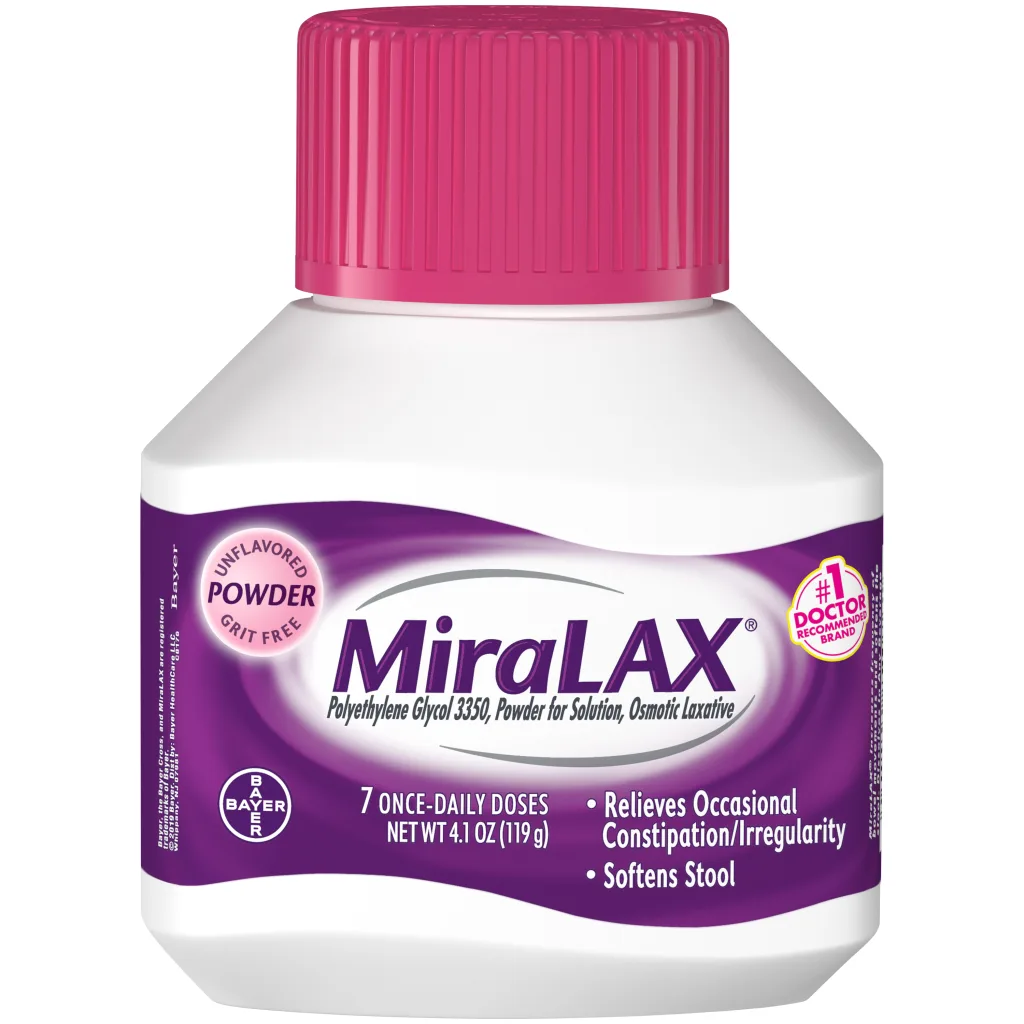Miralax is a popular over-the-counter laxative used to treat occasional constipation. It works by drawing water into the colon and softening the stool, making it easier to pass. While Miralax is generally safe and effective for most people, there are some potential side effects that should be considered before taking this medication. One of these potential side effects is vomiting.
Vomiting is one of the more serious side effects of taking Miralax. It can occur when too much of the medication is taken at once or when it’s taken on an empty stomach. Vomiting can also occur if you have an underlying medical condition that interferes with how your body absorbs and processes the drug. Generally, vomiting should not be a common side effect of taking Miralax, but if it does occur, seek medical attention right away as severe dehydration can result from vomiting.
If you experience any nausea or vomiting while taking Miralax, stop taking the medication immediately and contact your doctor for further advice. Your doctor may recommend changing your dosage or tryig a different type of laxative altogether in order to avoid any further problems. Additionally, drinking plenty of fluids and eating a balanced diet high in fiber will help keep your bowels regular without relying on laxatives like Miralax.
Overall, Miralax can be an effective way to treat occasional constipation, but like all medications it has its own set of risks and side effects that should be considered before use. If you experience any nausea or vomiting after taking this medication, stop using it immediately and contact your doctor for further advice and alternative treatment options.
The Effects of Taking a Laxative
Yes, a laxative can make you vomit. Vomiting is one of the most common symptoms of laxative overdose and can be accompanied by nausea, abdominal cramping, and diarrhea. Generally, these symptoms occur as a result of overstimulation of the digestive tract. If you experience any of these symptoms after taking a laxative, it is important to seek medical attention immediately to prevent dehydration and electrolyte imbalance.

Side Effects of Excessive MiraLAX Use
The side effects of taking too much Miralax can be serious and include diarrhea, excessive thirst, confusion, or seizures. Diarrhea can cause dehydration if you don’t drink enough fluids. More severe symptoms of an overdose may include vomiting, fainting, rapid heart rate, or irregular breathing. If you have taken too much Miralax, stop taking the medication and drink plenty of water. Seek medical assistance immediately if any of these symptoms occur.
When Is It Not Safe to Drink MiraLAX?
You should not drink MiraLAX if you have a bowel obstruction or intestinal blockage, any eating disorder, kidney disease, irritable bowel syndrome, rectal bleeding, nausea or vomiting, stomach pain, or a sudden change in bowel habits. Additionally, do not use MiraLAX if you are allergic to polyethylene glycol. If you have any of these conditions or are unsure if it is safe for you to use MiraLAX, please consult your doctor before doing so.
Vomiting and Constipation: Causes and Treatment
Vomiting and constipation can be caused by a number of things, including a dietary change, medication side effects, or an underlying medical condition. In some cases, it might be a sign of fecal impaction—a serious medical emergency in which a large mass of stool gets stuck in the colon and can’t be passed. If you’re experiencing symptoms like vomiting and constipation, it’s important to seek medical attention as soon as possible so that an accurate diagnosis can be made and appropriate treatment can begin.
Can Constipation Cause Vomiting of Feces?
Yes, constipation can make you vomit poop, also known as “feculent vomiting.” This is usually caused by a blockage in the intestines that causs food and waste to build up, which can lead to nausea and vomiting. Feculent vomiting can also be a symptom of intestinal diseases like IBS or Crohn’s disease, as well as other medical conditions such as pancreatitis or ulcerative colitis. In some cases, feculent vomiting may be caused by prolonged use of certain medications or herbal remedies that have a laxative effect. Regardless of the cause, it’s important to speak with your doctor if you experience this symptom.

The Effects of MiraLAX and How Long They Last
Yes, the side effects of MiraLAX may go away with continued use. In a study of people taking MiraLAX for chronic constipation, about 6% reported nausea as a side effect. However, this symptom may decrease or disappear completely over time as your body adjusts to the medication. It is important to talk to your doctor if you experience any persistent or severe side effects from MiraLAX.
What Is the Maximum Recommended Daily Dosage of MiraLAX?
It is not recommended to take more than one dose of MiraLAX per day. The recommended dose is 17 grams (or two heaping tablespoons) of powder mixed with 8 ounces of a cold or room temperature beverage, once per day. Taking more than the recommended dose could result in serious health risks. If you have any questions about the correct dosage for your individual needs, speak to your doctor or pharmacist for further information and advice.
How Long Does it Take for a MiraLAX Cleanout?
A MiraLAX cleanout usually takes between 1-3 days to complete. The first day will involve drinking a mixture of Gatorade and MiraLAX, and the next two days the patient will drink only Gatorade. It is important to drink plenty of fluids during this cleanout to avoid dehydration. After drinking the mixture, it typically takes between 6-12 hours for a bowel movement to occur. During this time frequent, watery bowel movements may occur until the bowel is fully cleansed.
What Medications Should Not Be Taken with MiraLAX
It is important to not mix MiraLAX with any soda or any carbonated beverage, as this can cause adverse reactions. Carbonation can cause the MiraLAX to foam and create a large amount of gas that can be uncomfortable. It is also important not to mix MiraLAX with any acidic beverages such as orange juice, lemonade, or other citrus juices since these can affect the absorption and efficacy of the medication. Additionally, it is best not to mix MiraLAX with dairy products like milk since this could lead to an upset stomach.
The Effectiveness of Taking MiraLAX on an Empty Stomach
MiraLAX is a laxative that is typically taken once a day as a single dose. It is recommended to take MiraLAX on an empty stomach, preferably in the morning. Taking it with food can reduce its effectiveness and delay the desired results. Additionally, if you are taking other medications, it is important to take MiraLAX at least one hour before or after taking them. To get the most benefit from your dose of MiraLAX, it’s best to take it on an empty stomach.
Is Everyday MiraLAX Use Safe for Constipation?
No, it is not recommended to take MiraLAX everyday for constipation. The instructions on the package indicate that it should be taken orally, once a day, for no more than seven days. If your constipation persists after seven days or if you experience any other unpleasant side effects, you should discontinue use and consult your doctor. It is important to remember that MiraLAX is a laxative and its primary purpose is to treat occasional constipation.

Conclusion
In conclusion, Miralax is generally considered safe to use, and it is rare for it to cause vomiting. However, if you are experiencing nausea, vomiting, abdominal cramping, or diarrhea after taking Miralax, it is best to stop taking the medication and speak with your doctor. Overdoses of Miralax can cause dehydration and electrolyte imbalance in children and seizures in adults. It is important to follow the instructions on the label when taking Miralax to avoid any negative side effects.
